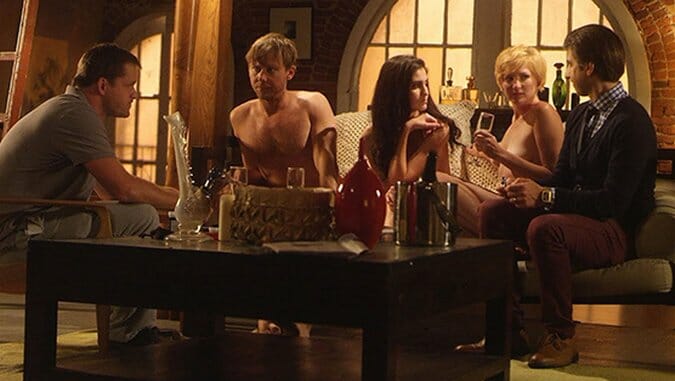The Last Time You Had Fun

Growing up is hard to do. Just ask the booming nostalgia economy: countless reboots of TV shows from the ‘80s and ‘90s; those “30 Under 30” lists that codify the notion of visionary talent as a young person’s game; the endless litany of retrospectives every time an album or cultural touchpoint turns ten. And in film, the yearning for a permanent adolescence has yielded serious cash for people like Judd Apatow, Paul Feig, Will Ferrell, Seth Rogen and their ilk, all of whom fight back against the straits of adult life and its responsibilities by giving us visions of gleefully irreverent heroes who refuse to grow up and, by implication, to give in. When they work, these characters and their films leave us refreshed and invigorated, happy to leave the theater less burdened by our own worries or self-seriousness. When they don’t—well, we’re left wishing everyone involved would just grow up, already.
Mo Perkins’s The Last Time You Had Fun, written by her partner Hal Haberman, projects a deep ambivalence about getting older. The set-up is familiar to anyone who’s seen a raunchy comedy of the sexes in the past decade: Thirty-something Ida (Eliza Coupe; Happy Endings) shows up unannounced at her older sister Alison’s (Mary Elizabeth Ellis; It’s Always Sunny In Philadephia) house—cue humdrum, odd couple trappings. Alison is a married mom who loves to lord her life’s relative stability over her younger sibling; Ida curses and smokes cigarettes, and she’s left her cheating husband to move back home with the sisters’ alcoholic mother. Alison, in a moment of big-sister graciousness, plans a night out for the two of them to let Ida blow off some steam. Oh, and speaking of blowing: in order to convince her husband to take care of their daughter for the night, Alison orally pleasures him, which Haberman’s script tries to play for laughs—everyone knows getting head goes right out the window when a man puts a ring on it, am I right, fellas!—in a flat taste of things to come.
Meanwhile, sad-sack soon-to-be divorcé Clark (Kyle Bornheimer) needs a night out, too, though he might not know it. “I’m a grown-up, and it isn’t important that I have fun anymore,” he says to the cheap seats. Fortunately, his best friend—and former best man—Will (Demetri Martin) has decided to take him out for a “divorce party” to get his spirits up. Though she doesn’t approve of Will’s plan to take her dad to a strip club, Clark’s precocious teenage daughter encourages him to get out of the house for the night. He reluctantly agrees, but he draws the line at changing out of his sweatpants. Will surprises him with a limo parked outside, driven by the laconic Betty (Charlyne Yi), and they’re off. Clark talks Will away from the strip club and to a wine bar, instead. We’ve seen enough of these films, where the hard-living cynical friend convinces the vulnerable, wounded protagonist to try the party lifestyle for 24 hours, to know Will and Clark are destined to run into Alison and Ida and spend a crazy night with them.
Predictability here is fine: this is a romantic comedy, and it’s working within established romantic comedy tropes. Problem is, The Last Time You Had Fun wants to be more than a romantic comedy, but it isn’t quite sure what that means. Punchlines are few and far between—the blowjob bit feels so tired it becomes depressing, and the banter between the two couples prior to their meeting (in the limo, Will: “A lot of people like to cut loose every now and then;” Clark: “I’m just a little worried they cut loose on this upholstery last night”) isn’t quick or loose enough to create the sense of real kinship between either pair, a requisite for the audience if we’re to find these shenanigans even mildly amusing. Much of the blame here falls at the feet of the four primary actors, none of whom can dig deeply enough into their characters to play them as anything more than types. Ellis comes closest, while the actual comedian here, Demetri Martin, can barely be bothered to change the tone of his voice from line to line. The cast isn’t helped by the relentlessly somber lighting, bland sets and ponderous score, all of which suggest a different film entirely.